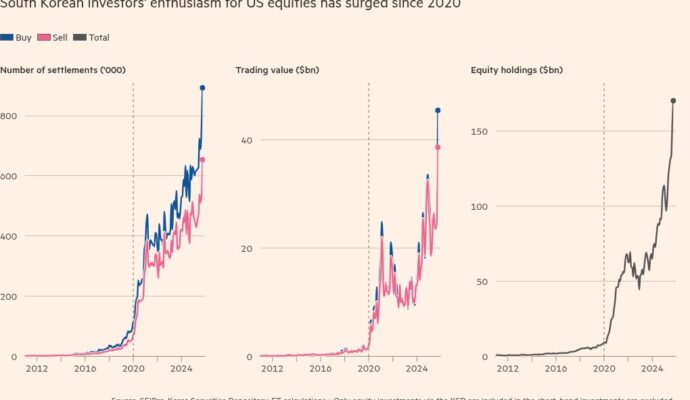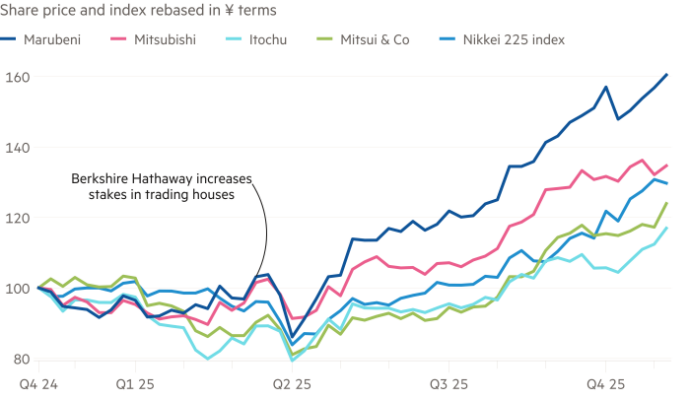Unlock the Editor’s Digest for free
Roula Khalaf, Editor of the FT, selects her favourite stories in this weekly newsletter.
South Korean retail investors are contributing to dramatic swings in the share prices of some US-listed companies, as they take aggressive trading strategies long used in their domestic market to a booming Wall Street.
Known for their high-risk tolerance, herd behaviour and use of leverage, South Korean traders have piled into US markets this year, accounting for a significant slice of the trading in some of Wall Street’s most volatile stocks. Their holdings of US equities have nearly doubled this year to a record $170bn at the end of October, according to Korea Securities Depository data.
Many have been drawn to the resurgence in meme stocks this year, helping fuel a craze that first took hold during the Covid-19 pandemic.
“Korean retail investors are strengthening meme stock phenomena in the US stock market,” said Seiwoon Hwang, a senior research fellow at the Korea Capital Market Institute.
South Korea’s stock market is known for its volatility, with speculative retail a major force — accounting for more than half of daily turnover — in the $2tn market.
Owen Lamont, a portfolio manager at Acadian Asset Management, thinks this influx of speculative money could change the nature of US markets by distorting valuations. Earlier this year he wrote an article on South Korean retail investor behaviour titled “The Squid Game stock market” — a reference to Netflix’s violent Korean hit series.
“Another theory is the American stock market is just going to turn into the Korean stock market,” Lamont said. “They’ve been doing it [buying more speculative stocks] in Korea for many years. It could be America’s future.”
Lossmaking quantum computing group IonQ, whose shares soared as much as about 370 per cent between March and their record high last month, was the fifth most popular US stock holding for South Korean investors, who owned a combined $4.4bn of the company’s $20bn of shares at the end of October, according to Korea Securities Depository data.
“Korean retailers are just crazy. They are not like average retail investors in other parts of the world. They are very aggressive,” said Jongmin Shim, Korea equity strategist at CLSA.
During October, South Koreans purchased $239.2mn worth of shares in Beyond Meat, which experienced a vertiginous rise and then fall over the course of the month. The company’s market capitalisation is at present about $960mn, although it rose much higher at times last month.
“The lunatic fringe [of very speculative stocks] is getting more crazy and bigger,” said Lamont.
Although South Korea boasts this year’s best-performing stock market, thanks to optimism over AI and corporate governance reforms, many of the country’s retail traders have nevertheless been drawn to the US. Years of underperformance relative to Wall Street pushed them away from their home market and they have yet to return in size, said Shim.
South Korea’s Kospi has doubled over the past decade — helped by a roughly 70 per cent gain this year — compared with a more than 300 per cent rise in Wall Street’s S&P 500 in Korean won terms.
The won has fallen nearly 5 per cent against the dollar over the past three months, with analysts pointing to Korean investors buying foreign assets as a major factor.
Chung Ji-eun, a 37-year-old employee in the financial sector, is one of many South Korean retail investors betting on US stocks.
“There is no better way to make a lot of money as a salaried worker, given low interest rates,” she said. “The domestic market is booming now but I don’t think it will last long. But I have long-term faith in the US stock market.”
She has invested about Won600mn ($410,000) in various US stocks, ranging from popular names such as Tesla and United Health to lesser-known stocks such as Intuitive Machines and Chime Financial. She has lost about Won10mn since she began investing in the US last year.
Chung uses a local brokerage’s mobile trading system and often sacrifices sleep to trade US stocks for about two hours from midnight Korea time because of the 14-hour time difference.
“It is so easy to buy and sell US stocks in the system. Dopamine keeps me awake late into the night,” she said. “You don’t even have to convert money yourself. It is automatically done.”
The South Korean phenomenon is linked to the country’s high property prices and wealth inequality, according to CLSA’s Shim, which is driving many investors to take more speculative punts in the hope of quick gains.
Many ordinary Koreans “were kind of forced to invest in financial assets because of rising property prices”, Shim said.
Chung’s Won250mn investment in Ocean Power Technologies, a marine power and ocean data collection provider listed on the New York Stock Exchange, has nearly halved in value since late last year.
“A colleague recommended the stock to me but the losses are getting bigger day by day,” said Chung. “I am just holding them, believing that they will rebound some day.”
Additional reporting by Joseph Cotterill in London




